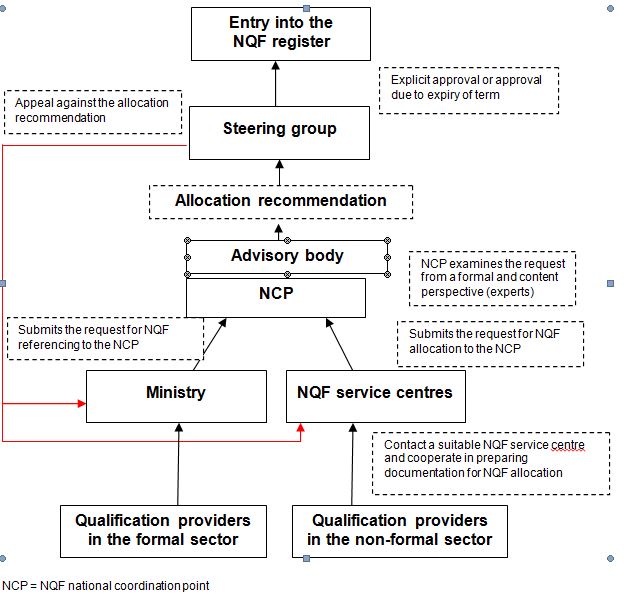The federal act (NQR-Gesetz) on the national qualifications framework (NQF) entered into force on 15 March 2016 and officially established the NQF in Austria. It also marked the end of an extended development process on defining the key points of the NQF, involving a wide range of stakeholder groups. The NQF law now provides a clear basis for allocating qualifications.
The NQF objective is promoting transparency and comparability of qualifications in Austria and Europe with no impact on existing professional or other rights and entitlements. The Austrian NQF is not a regulatory framework or part of the government’s administrative jurisdiction but a service to the private sector provided by the federal government.
At the core of the NQF law are provisions governing design of the procedure for allocating qualifications, as well as the responsible bodies and institutions. According to the law, NQF allocations are based on the descriptors of the European qualifications framework (EQF) and the qualifications framework for the European higher education area (Dublin descriptors). A ‘Y-model’ is thus legally established, so that bachelor, master and PhD/doctoral degrees are directly classified to levels 6, 7 and 8. All the other qualifications are classified according to an allocation request.
The law defines the tasks assigned to relevant NQF bodies. The NQF coordination point (NCP) will be in charge of examining allocation requests from a formal and content-related perspective; for this it can use the know-how of relevant experts. An NQF advisory board will be set up to advise the NQF coordination point. It will comprise seven experts from various qualification contexts: from ‘professional practice’ and ‘initial, further and continuing education and training’, as formulated by the law. Following examination of the allocation requests, the NCP will submit a recommendation to the NQF steering group, formed from representatives of the different ministries, social partners, higher education and adult education sector, public employment service, federal youth representation and the provinces. The NQF steering group will advise federal ministries coordinating the NQF (the Ministry of Education and the Ministry of Science, Research and Economy) on strategic matters and will have the right to appeal against the NCP’s allocation recommendations.
The law distinguishes classification of formal (legally regulated) and non-formal (not legally regulated) qualifications (see diagram). In both cases it will be necessary to submit an allocation request to the NCP with a detailed description of the qualification, related learning outcomes and its assessment procedure. The applicants for formal qualifications are competent federal ministries. Since there are no official competent bodies for non-formal qualifications, so-called NQF service centres will apply for non-formal qualifications; these will serve as intermediaries between the providers of non-formal qualifications and the NQF bodies, aiming to support qualification providers in the classification process and safeguard the quality and validity of allocation requests. They will be nominated by the Ministry of Education in consultation with the Ministry of Science, Research and Economy and will be authorised to submit requests for allocation on behalf of qualification providers.
Diagram 1 Classification procedure

Source: ibw based on the NQF law.
Formal qualifications will be classified first. Following establishment of NQF service centres (expected for the end of 2016/beginning of 2017) the first allocations of non-formal qualifications will be made.
